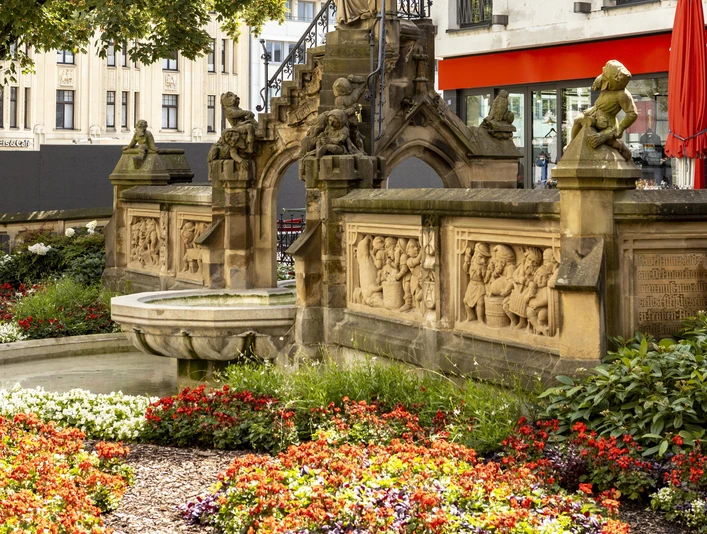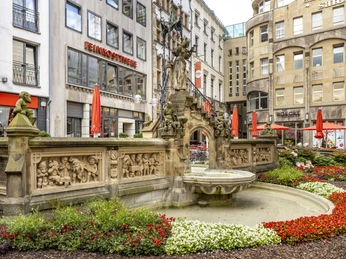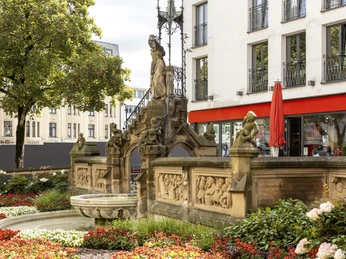- Photos & Map
How would you like to arrive?
- Details
- Useful Information
- Nearby
Cologne’s residents generally like to take things easy. They sway to the carnival songs while sitting down, drink a Kölsch beer from time to time, and have a laissez-faire mindset. If you believe there’s a grain of truth in old legends, the people of Cologne had an even more leisurely time of it many decades ago. That’s because their work used to be done by others, during the night, silently and secretly — by the pixies known as the Heinzelmännchen. The pixies worked for artisans such as bakers, butchers, carpenters and tailors — until the curiosity of a tailor’s wife brought the entire arrangement to an end.
The Heinzelmännchenbrunnen, or Pixies’ Fountain, stands today in Cologne as a monumental representation of this famous story. It’s located very close to Cologne Cathedral and directly next to the well-known Früh brewery pub.
The Cologne Beautification Association donated this fountain around 1899 to commemorate what would have been the hundredth birthday of the versatile artist August Kopisch, author of the ballad “Die Heinzelmännchen zu Köln”. The fountain was a representation in stone of the poem’s dramatic turning point — the scene in which the Heinzelmännchen tumble down the stairs after tripping over the dried peas that had been scattered there. People familiar with the poem know that after the Heinzelmännchen were “discovered”, they stopped working for the leisurely residents of Cologne and disappeared forever. Sad, isn’t it?
Or is the tailor’s wife warning people not to be overly curious in their daily life? You could have a discussion or two about that at the edge of the fountain.
The design on the back of the fountain shows that the poet, the architect and the sculptor wanted the fountain ensemble to represent shrewdness and wisdom. In the design, an owl is sitting on a book and holding a magnifying glass in its claws.
Over the years, the sandstone of the sculptures and the relief panels was increasingly worn away by age and the weather, but unfortunately the restoration measures carried out in the 1990s were not very effective. Finally, the Früh brewery pub took over the sponsorship of the fountain in 2018 and had it comprehensively restored at a cost of approximately €180,000.
The original elements that were replaced are exhibited in Cologne City Museum. Incidentally, the barely legible banner inscribed “Neugierig war des Schneiders Weib” (Curious Was the Tailor’s Wife) in the middle of the fountain is the original sculpture.
The name “Heinzelmännchen” can probably be traced back to the term “Heinzel” for the workers who removed the water from mining pits — a job that shorter men would be suited for. It might also be derived from the archaic verb heinzen, which means “helping” or “carrying”.
The Heinzelmännchenbrunnen, or Pixies’ Fountain, stands today in Cologne as a monumental representation of this famous story. It’s located very close to Cologne Cathedral and directly next to the well-known Früh brewery pub.
The Cologne Beautification Association donated this fountain around 1899 to commemorate what would have been the hundredth birthday of the versatile artist August Kopisch, author of the ballad “Die Heinzelmännchen zu Köln”. The fountain was a representation in stone of the poem’s dramatic turning point — the scene in which the Heinzelmännchen tumble down the stairs after tripping over the dried peas that had been scattered there. People familiar with the poem know that after the Heinzelmännchen were “discovered”, they stopped working for the leisurely residents of Cologne and disappeared forever. Sad, isn’t it?
Sculptures, narrative moments, drama and a plaque with a poem
The Pixies’ Fountain consists of a fountain basin, a double stairway with sculptures of the tailor’s wife and the Heinzelmännchen, and eight relief panels showing them doing the work of joiners, carpenters, bakers, butchers, innkeepers and tailors, as well as excerpts from the ballad in Gothic script. Between the relief panels you can see the symbols of these trades presented as coats of arms. Right in front is a plaque showing the eight versus of the poem, which visitors can read for themselves and read aloud to their children. The entire fountain ensemble is fenced in and decorated with flowerbeds.The tailor’s wife: a beauty — and a secret heroine?
The large statue of the tailor’s wife occupies a special position. Beautiful and very impressive, she stands at the top of the stairs with a lantern in her hand and looks down at the Heinzelmännchen. Interested visitors generally suspect that behind this positive presentation is a Prussian mindset that set the people of Cologne on the right track toward diligence and away from the Kölsch life of ease.Or is the tailor’s wife warning people not to be overly curious in their daily life? You could have a discussion or two about that at the edge of the fountain.
The design on the back of the fountain shows that the poet, the architect and the sculptor wanted the fountain ensemble to represent shrewdness and wisdom. In the design, an owl is sitting on a book and holding a magnifying glass in its claws.
The construction and restoration of the Pixies’ Fountain
The Pixies’ Fountain was built between 1899 and 1900 by the master builder of the archdiocese, Heinrich Renard, who was regarded as one of the most outstanding church architects, and by his father, the sculptor Edmund Renard.Over the years, the sandstone of the sculptures and the relief panels was increasingly worn away by age and the weather, but unfortunately the restoration measures carried out in the 1990s were not very effective. Finally, the Früh brewery pub took over the sponsorship of the fountain in 2018 and had it comprehensively restored at a cost of approximately €180,000.
The original elements that were replaced are exhibited in Cologne City Museum. Incidentally, the barely legible banner inscribed “Neugierig war des Schneiders Weib” (Curious Was the Tailor’s Wife) in the middle of the fountain is the original sculpture.
Who were the Heinzelmännchen?
Tiny, diligent, with pointed caps on their heads — these are the attributes of the benevolent familiar spirits of Cologne. They’re similar to the English and Scottish brownies, the kabouters from the Netherlands and the nissen from Norway and Denmark. They assist craftsmen or help with the housework, and they don’t like to be seen. It’s said that some of them accept small presents and that they like oatmeal porridge and honey.The name “Heinzelmännchen” can probably be traced back to the term “Heinzel” for the workers who removed the water from mining pits — a job that shorter men would be suited for. It might also be derived from the archaic verb heinzen, which means “helping” or “carrying”.
Useful Information
Eligibility
Suitable for any weather
for Groups
for families
for individual guests
Suitable for the Elderly
Payment methods
Entrance Free
Parking facilities
The Pixies’ Fountain is located on the central route into Cologne's historic old town, around 450 metres from the main railway station.
Nearby


